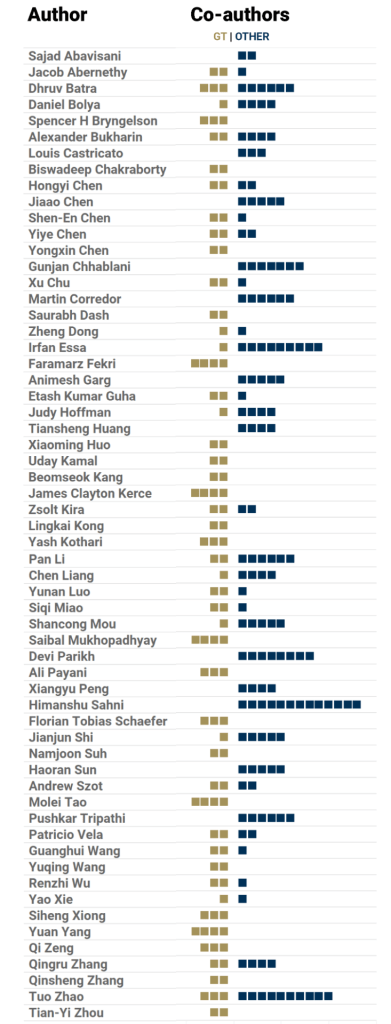Georgia Tech at ICLR 2023
Georgia Tech is a leading contributor to ICLR 2023, a research venue focused on deep learning, a method in artificial intelligence (AI) that teaches computers to process data in a way that is inspired by the human brain.
* ICLR divides accepted papers into three tiers – Top 5% notable papers; Top 25% notable papers; and Poster papers
Research Partners
Amazon • Apple • Brown University • Carnegie Mellon University • Duke University • Georgia State University • Google • Hebrew University of Jerusalem • Hong Kong University of Science and Technology • JD Explore Academy • Louisiana State University • Massachusetts Institute of Technology • META • Microsoft • Oregon State University • Princeton University • Purdue University • Rice University • Salesforce • Samsung • Simon Fraser University • Stanford University • Susquehanna International Group • Technion • Tel Aviv University • Tsinghua University • University of Alberta • University of California, San Diego • University of Michigan • University of Pennsylvania • University of Sydney • University of Texas at Austin • University of Toronto • University of Washington • University of Waterloo •
RESEARCH






FEATURED RESEARCH
Like Humans and Animals, AI Agents Find Their Way Through Memory
Memory may be just as important to artificial intelligence (AI) agents in creating ‘mental maps’ as it is to humans and animals.
A recent paper authored by Georgia Tech researchers makes a surprising discovery — blind AI agents use memory to create maps and navigate through their surrounding environment.
Erik Wijmans, the lead author of the paper, said the idea for his research began by asking if AI agents might mimic human and animal behavior in how they navigate and adjust to their environments.
Best Paper Award recipients Ari Morcos, Dhruv Batra, and Erik Wijmans on May 1 in Kilagi, Rwanda. Wijmans presented the work at a special award ceremony. ICLR 2023 awarded only four best papers. (Not pictured: Manolis Savva, Irfan Essa and Stefan Lee)




Among ICLR’s 1,500+ accepted papers, the following research from Georgia Tech is included in the top categories.

Emergence of Maps in the Memories of Blind Navigation Agents
Erik Wijmans, Manolis Savva, Irfan Essa, Stefan Lee, Ari S. Morcos, Dhruv Batra
In-context Reinforcement Learning with Algorithm Distillation
Michael Laskin, Luyu Wang, Junhyuk Oh, Emilio Parisotto, Stephen Spencer, Richie Steigerwald, DJ Strouse, Steven Stenberg Hansen, Angelos Filos, Ethan Brooks, Maxime Gazeau, Himanshu Sahni, Satinder Singh, Volodymyr Mnih
Token Merging: Your ViT But Faster
Daniel Bolya, Cheng-Yang Fu, Xiaoliang Dai, Peizhao Zhang, Christoph Feichtenhofer, Judy Hoffman
Associative Memory Augmented Asynchronous Spatiotemporal Representation Learning for Event-based Perception
Uday Kamal, Saurabh Dash, Saibal Mukhopadhyay
BC-IRL: Learning Generalizable Reward Functions from Demonstrations
Andrew Szot, Amy Zhang, Dhruv Batra, Zsolt Kira, Franziska Meier
Emergence of Maps in the Memories of Blind Navigation Agents
Erik Wijmans, Manolis Savva, Irfan Essa, Stefan Lee, Ari S. Morcos, Dhruv Batra
gDDIM: Generalized denoising diffusion implicit models
Qinsheng Zhang, Molei Tao, Yongxin Chen
GRACE-C: Generalized Rate Agnostic Causal Estimation via Constraints
Mohammadsajad Abavisani, David Danks, Sergey Plis
ROSCOE: A Suite of Metrics for Scoring Step-by-Step Reasoning
Olga Golovneva, Moya Peng Chen, Spencer Poff, Martin Corredor, Luke Zettlemoyer, Maryam Fazel-Zarandi, Asli Celikyilmaz
See you in Rwanda!
Web Development: Joshua Preston
Writer: Nathan Deen
Interactive Visualizations and Data Graphics: Joshua Preston





